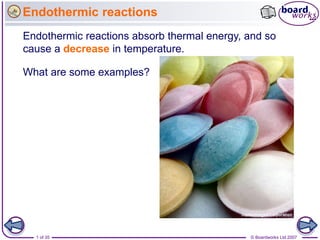Weitere ähnliche Inhalte
Ähnlich wie IGCSE 11.1.5 (20)
IGCSE 11.1.5
- 2. Endothermic reactions
Endothermic reactions absorb thermal energy, and so
cause a decrease in temperature.
What are some examples?
thermal
decomposition, e.g.
calcium carbonate in
a blast furnace
2 of 35 © Boardworks Ltd 2007
- 3. Endothermic reactions
Endothermic reactions absorb thermal energy, and so
cause a decrease in temperature.
What are some examples?
thermal
decomposition, e.g.
calcium carbonate in
a blast furnace
photosynthesis
3 of 35 © Boardworks Ltd 2007
- 4. Endothermic reactions
Endothermic reactions absorb thermal energy, and so
cause a decrease in temperature.
What are some examples?
thermal
decomposition, e.g.
calcium carbonate in
a blast furnace
photosynthesis
some types of
electrolysis
4 of 35 © Boardworks Ltd 2007
- 5. Endothermic reactions
Endothermic reactions absorb thermal energy, and so
cause a decrease in temperature.
What are some examples?
thermal
decomposition, e.g.
calcium carbonate in
a blast furnace
photosynthesis
some types of
electrolysis
sherbet!
5 of 35 © Boardworks Ltd 2007
- 6. Endothermic reaction: energy transfer
What happens to energy in the reaction between
ammonium nitrate and water?
6 of 35 © Boardworks Ltd 2007
- 7. Endothermic reaction: energy transfer
What happens to energy in the reaction between
ammonium nitrate and water?
During the reaction, thermal energy
from the reaction mixture is converted
to chemical energy in the products.
7 of 35 © Boardworks Ltd 2007
- 8. Endothermic reaction: energy transfer
What happens to energy in the reaction between
ammonium nitrate and water?
During the reaction, thermal energy
from the reaction mixture is converted
to chemical energy in the products.
This causes the temperature of the
reaction mixture to fall.
8 of 35 © Boardworks Ltd 2007
- 9. Endothermic reaction: energy transfer
What happens to energy in the reaction between
ammonium nitrate and water?
During the reaction, thermal energy
from the reaction mixture is converted
to chemical energy in the products.
This causes the temperature of the
reaction mixture to fall.
Thermal energy from the
surroundings is transferred to the
reaction mixture, and the temperature
eventually returns to normal.
9 of 35 © Boardworks Ltd 2007
